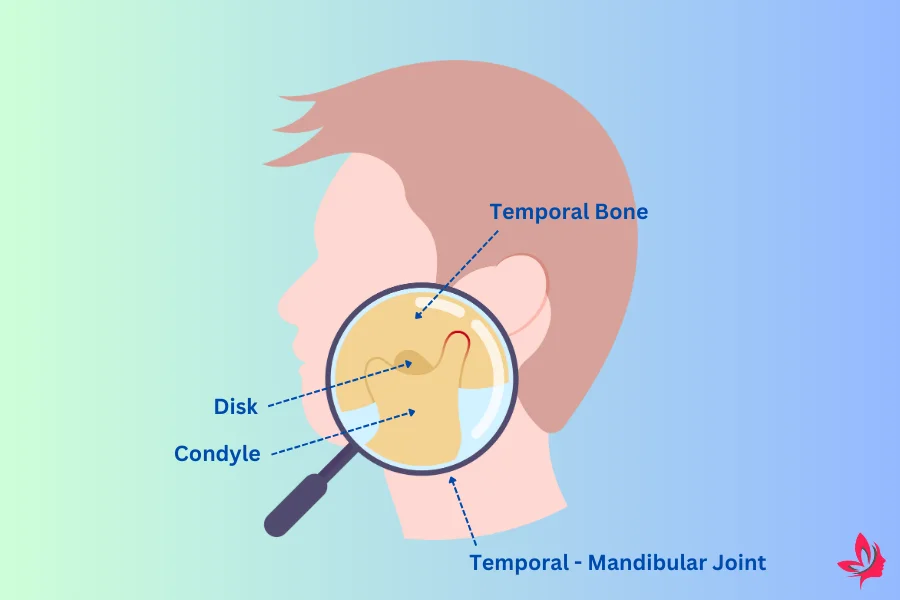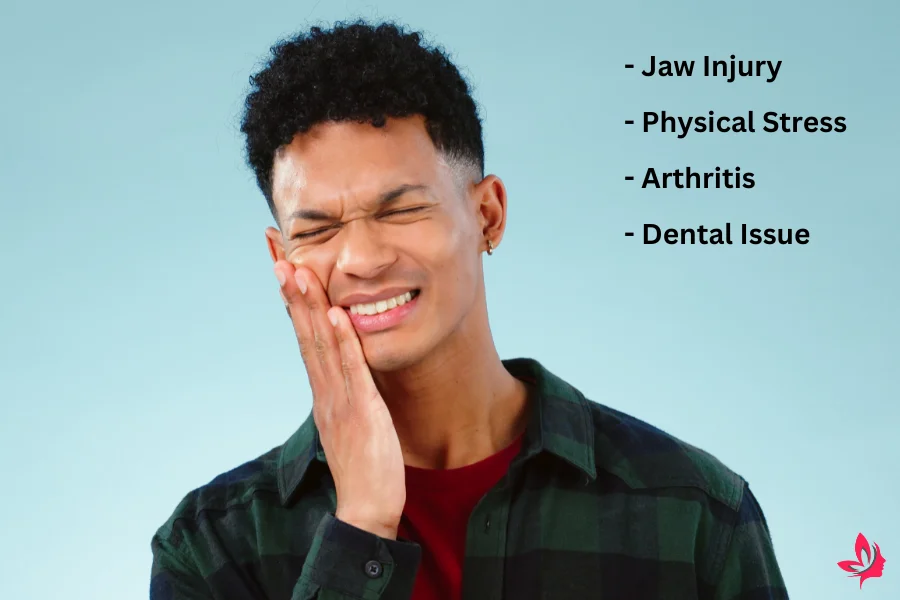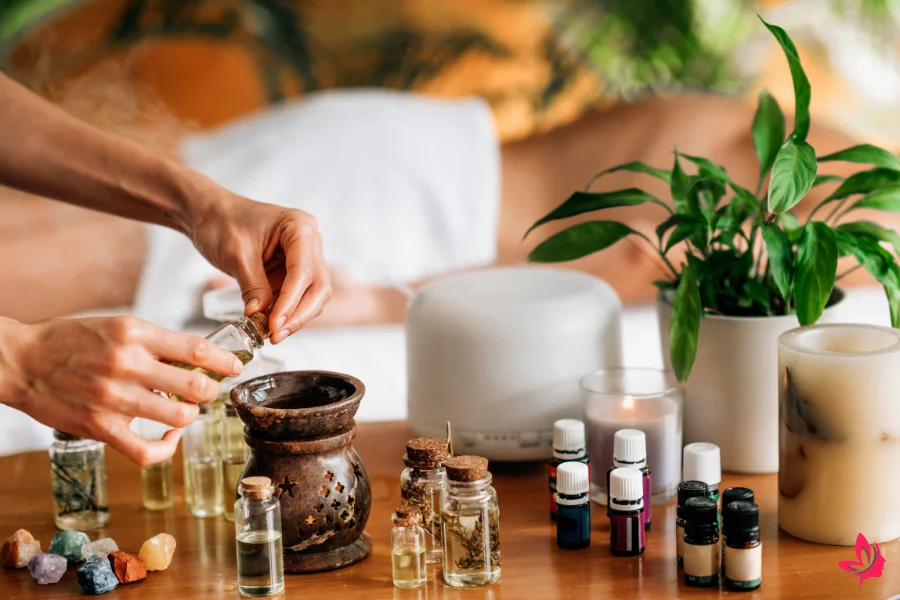Home remedy for lockjaw can provide much-needed relief for those experiencing discomfort due to TMJ disorders.
Many suffer from the pain and tightness in the jaw that these conditions cause.
Applying a warm compress can help relax tense muscles and alleviate these symptoms. Also, A cold compress can reduce acute pain.
Beyond temperature therapy, other at-home treatments can also assist in managing lockjaw.
Eating soft foods and staying hydrated can make a significant difference.
Specific jaw exercises like Goldfish may promote better jaw mobility and lessen tension.
Understanding Lockjaw and TMJ Disorders

A locked jaw, commonly known as a lockjaw, is a painful condition often involving jaw muscles and joints.
It can arise from a range of issues, such as trauma or dental infections.
Another common problem linked to this condition is temporomandibular joint disorders (TMJ disorders), which affect the jaw joint and the muscles controlling its movement.
Symptoms of lockjaw include pain, stiffness, and difficulty opening the mouth.
The jaw movement might feel restricted, possibly causing significant discomfort.
Managing these symptoms often involves home remedies like using warm or cold compresses to reduce pain and inflammation.
TMJ disorders often occur due to issues such as jaw injuries or arthritis.
TMJ pain can range from mild to severe pain, affecting daily activities.
A physical therapist might recommend exercises to improve the range of motion and relieve strain on the jaw area.
Treatment options for TMJ disorders and Lockjaw include over-the-counter pain relief, muscle relaxants, and lifestyle changes.
Consuming soft foods and practicing relaxation techniques can help ease the symptoms.
It is crucial to maintain good oral hygiene to prevent further dental problems.
A healthcare provider may suggest a treatment plan involving medications or physical therapy in more severe cases.
It’s essential to consult a professional if the symptoms persist.
Regular follow-ups can ensure that the underlying cause of the symptoms is effectively addressed.
Sometimes, using mouthguards at night can help alleviate symptoms and prevent further strain on the jaw.
Symptoms of TMJ Disorders

Temporomandibular joint disorders can cause uncomfortable symptoms affecting the jaw and surrounding areas.
These symptoms can vary in intensity and impact daily activities like speaking and eating.
Facial Pain and Stiffness
Jaw muscles often become tight and sore in those with TMJ disorders.
This can lead to significant discomfort in the cheeks, temples, and around the mouth.
The pain sometimes resembles a tension headache, originating in the jaw joint and radiating across the face.
Physical therapy and relaxation techniques may help reduce stiffness and improve muscle function.
In severe cases, consulting a healthcare provider for proper treatment is recommended to address these painful muscle contractions.
Jaw Popping and Clicking
One of the most common symptoms of TMJ disorders is a popping or clicking sound when moving the jaw.
This occurs during speaking, chewing, or even yawning.
These sounds are often due to displacement in the jaw joint and can be accompanied by pain.
Frequent clicking may indicate a more severe condition requiring medical advice.
Simple exercises and jaw movement therapies can sometimes decrease the frequency of these sounds and improve jaw function.
Ear Pain and Tinnitus
Ear pain or fullness in the ears and tinnitus or ringing can also be linked to TMJ disorders.
The proximity of the jaw joint to the ear canal often causes this discomfort.
Evaluating the underlying cause is crucial.
Treatment plans may include muscle relaxants or a warm compress to alleviate pain.
Individuals experiencing these symptoms should consult a healthcare professional to rule out dental problems and ear infections.
Difficulty Chewing or Speaking
TMJ disorders may lead to difficulty with essential mouth functions.
Patients often struggle with chewing or speaking due to pain or limited range of motion in the jaw.
Eating soft foods can temporarily ease this discomfort while exploring home remedies like cold packs to reduce inflammation.
If the jaw becomes locked in a closed position or symptoms escalate, seeking immediate medical attention ensures proper care and helps avoid future complications.
Common Causes of TMJ Disorders

TMJ disorders can arise from a variety of reasons.
These issues often stem from problems in the jaw joint or surrounding jaw muscles.
Many factors contribute, including jaw injuries and physical stress.
Individuals who frequently grind their teeth at night may also experience TMJ symptoms due to pressure on the lower jaw.
Arthritis is another underlying cause.
Inflammation can affect the jaw movement and lead to discomfort in the jaw area.
Rheumatoid arthritis, in particular, can impact the joints and cause soft tissue inflammation.
Dental problems and oral hygiene practices can play a role as well.
Misalignment of the teeth or other dental conditions may cause stress on the jaw.
Regular check-ups with a dentist can help identify and address these issues early on.
Stress contributes significantly to TMJ disorders.
People under stress might unknowingly clench their jaws or tense their mastication muscles, leading to jaw pain.
Relaxation techniques like deep breathing or meditation can be beneficial.
Tetanus infection is a rare condition that may lead to a locked jaw, a severe TMJ disorder.
This severe bacterial infection, caused by Clostridium tetani, warrants immediate medical attention. The tetanus vaccine is an effective preventive measure.
Injuries such as impacts to the side of your jaw can result in TMJ disorders.
Sports injuries or accidents might lead to jaw misalignment or muscle spasms.
A healthcare provider can assess these issues through a thorough physical examination and medical history review.
Treatment options can involve a treatment plan that includes physical therapy, muscle relaxants, or using an ice pack to manage pain.
Engaging with a physical therapist and sticking to a proper treatment regimen can aid in alleviating symptoms.
Initial Home Treatment Strategies

Effective home treatments can alleviate the discomfort caused by lockjaw and Temporomandibular Joint (TMJ) disorders.
Focus on resting the jaw, using heat or cold therapy, and performing gentle exercises for relief.
Jaw Rest Techniques
To help TMJ symptoms, keeping the jaw muscles relaxed is key.
Avoid eating hard or crunchy foods that require excessive chewing.
Opt for soft foods such as soups and smoothies to minimize strain on the jaw joint.
Limit extreme mouth openings to prevent further stress on the lower jaw.
By adopting such simple habits, individuals can contribute to reducing jaw pain.
Consider the use of a mouth guard to prevent clenching during sleep, which often contributes to painful conditions associated with TMJ disorders.
Heat and Cold Therapy
Alternating between heat and cold therapy can be an effective home remedy for TMJ treatment.
A warm compress can help reduce muscle tension and improve blood flow, relieving painful muscle contractions.
Applying an ice pack in a circular motion around the jaw area for about 15 minutes daily can lessen inflammation.
When used appropriately, these methods can significantly help soothe the symptoms of lockjaw. Always wrap ice in a cloth to avoid direct skin contact.
Gentle Jaw Exercises
Engaging in gentle jaw exercises can increase the range of motion and ease the pain.
Simple exercises, such as slowly opening and closing the mouth or moving the jaw side-to-side, can promote flexibility.
These exercises should be performed cautiously to avoid causing more discomfort.
They can strengthen the muscles that support the jaw joint if done regularly.
Consult with a healthcare provider or physical therapist for a personalized exercise plan, especially if TMJ disorders persist despite home treatment efforts.
Nutrition and Lifestyle Adjustments

Proper nutrition and various lifestyle changes can significantly aid in managing TMJ disorders and preventing lockjaw symptoms.
Implementing a soft foods diet, reducing stress, and eliminating jaw-straining habits are crucial.
Soft Foods Diet
A diet focusing on soft foods helps alleviate pressure on the jaw muscles.
Individuals can minimize discomfort by consuming yogurt, mashed potatoes, and scrambled eggs.
These choices allow the jaw joint to rest and heal, reducing muscle spasms and promoting recovery.
Avoid hard-to-chew items like nuts, crunchy foods, and tough meats, which can aggravate TMJ pain.
Eating softer meals can be a simple yet effective home remedy for lockjaw symptoms.
Stress Reduction Methods
Stress can impact the jaw muscles, leading to tension and pain.
Employing relaxation techniques such as deep breathing and mindfulness can aid in managing stress levels.
Regular physical activity and exercises like yoga can boost overall health and reduce muscle tension in the jaw area.
Meditation and visualization practices also provide relief.
These methods encourage relaxation and can help prevent painful muscle contractions associated with TMJ disorders.
Elimination of Jaw-Straining Habits
Habits that strain the jaw, such as teeth grinding and nail-biting, can worsen jaw pain.
Identifying and altering these behaviors is vital for improving TMJ symptoms.
A night guard at bedtime can prevent teeth grinding, protecting the temporomandibular joint from excessive pressure.
Regularly practicing simple exercises to enhance jaw movement and maintain the range of motion can also be beneficial.
These changes, alongside other adjustments, serve as an effective treatment plan for those suffering from lockjaw and TMJ pain.
Alternative Remedies and Supplements

When dealing with temporomandibular joint disorders (TMJ disorders), exploring alternative remedies alongside conventional treatments can be beneficial.
Utilizing essential oils, herbal applications, and a proper intake of supplements like magnesium and calcium may provide additional support for managing symptoms of lockjaw and related jaw pain.
Essential Oils and Herbal Applications
Essential oils like lavender and peppermint are often used for their calming and anti-inflammatory properties.
Applying these oils can aid in reducing muscle tension around the jaw joint.
Applying a few drops of diluted essential oil in a circular motion on the side of your face can relieve muscle spasms associated with TMJ disorders.
Herbs such as chamomile and valerian can also be beneficial.
These can be consumed as teas or used in baths to enhance relaxation.
This approach may complement other TMJ treatment options, such as simple exercises and lifestyle changes, to alleviate pain from a locked jaw and improve range of motion.
Magnesium and Calcium Intake
Magnesium and calcium are critical in maintaining muscle function and reducing painful muscle contractions.
Including foods rich in these minerals, such as leafy greens, nuts, and seeds, can support the health of jaw muscles and may ease tension or pain.
In some cases, a healthcare provider may recommend supplements to address deficiencies.
Adequate levels of magnesium and calcium can be particularly beneficial in mitigating TMJ disorder symptoms and enhancing the jaw area’s overall health.
For individuals experiencing significant symptoms of lockjaw, consulting with a professional about supplement intake is advisable.
When to Seek Professional Medical Advice

Home remedies for lockjaw can be somewhat effective, but it’s important to know when to seek professional help.
Temporomandibular joint disorders can cause significant discomfort. If you experience jaw pain or stiffness, seeking advice from a healthcare provider is crucial.
Look for symptoms indicating severe bacterial infection or any underlying cause requiring medical intervention. These may include persistent muscle spasms in the jaw, severe pain, or symptoms of lockjaw that do not improve with home care like ice packs or warm compress applications.
If you experience difficulty with jaw movement or are stuck in a closed position, seeing a medical professional who can assess your condition is wise.
A healthcare provider can recommend a treatment plan involving muscle relaxants or physical therapy for the jaw muscles.
Proper treatment is essential when additional symptoms occur—such as swelling, fever, or a locked jaw caused by dental problems. Immediate medical attention might be necessary when the cause of lockjaw extends beyond typical dental infections, involving conditions like tetanus infection or significant inflammation of the soft tissue.
A physical examination is necessary in severe cases to determine the specific issue and potential treatment options.
If home remedies do not alleviate TMJ symptoms or jaw joint issues, seeing a healthcare professional is the next step to ensuring proper care and recovery.
Final Thoughts
Lockjaw can be uncomfortable, but multiple strategies exist to manage it at home.
Incorporating a few simple techniques can provide relief and improve the quality of life for those dealing with TMJ disorders.
Staying hydrated is essential. Drinking plenty of water helps keep muscles relaxed, alleviating jaw tension.
Stress-reduction methods like deep breathing or meditation may also positively impact jaw tension.
Applying a warm, moist compress can be beneficial. The heat can relieve pain and reduce muscle tightness. For the best results, it’s recommended to use a compress several times a day.
Goldfish exercises are another practical method. These involve gently opening and closing the jaw to stretch and strengthen the muscles. This simple exercise can be a helpful addition to your daily routine.
Key Takeaways:
- Hydration is vital for relaxed muscles.
- Stress management can reduce TMJ symptoms.
- Warm compresses offer pain relief.
- Goldfish exercises may improve jaw mobility.
The right approach to managing lockjaw may vary for each individual. Testing remedies and observing their effects can help find the best-personalized strategy.
Frequently Asked Questions
Lockjaw, also related to TMJ disorders, can be improved with home remedies like warm compresses and jaw exercises. Staying hydrated and avoiding stress on the jaw can also help manage symptoms effectively.
What is the fastest way to cure lockjaw?
Applying a hot or cold compress can quickly relieve tension. Gentle jaw exercises, such as partial opening and closing of the mouth, can also help improve flexibility.
How do you release a lockjaw?
Using a warm compress for 10-15 minutes can relax the muscles. Gently massage the jaw joint to encourage movement, which may also help.
How can I treat my jaw at home?
Applying a warm, moist compress several times daily can ease TMJ pain. Avoiding gum chewing and hard foods can also lessen strain on the jaw.
What can I put on a locked jaw?
A warm compress can relax tense muscles, and ice packs can reduce inflammation if the area is swollen.
How to open a locked jaw?
Slowly and gently moving the jaw up and down can help loosen the lock. Incorporating exercises like the goldfish exercise can also be beneficial.
Does drinking water help with lockjaw?
Drinking water keeps the body hydrated and may aid in overall muscle function. Hydration helps maintain better joint lubrication.
Will Lockjaw go away on its own?
Mild cases of lockjaw often resolve with home care, such as rest and heat application. Persistent cases might require medical attention.
How to release a tight jaw?
Practicing relaxation techniques like deep breathing can reduce muscle tension. Avoiding clenching can prevent further tightness.
How to realign the jaw at home?
Gentle joint exercises and mindful posture can promote better alignment. Consulting a therapist for specific exercises might be helpful.
What is the leading cause of lockjaw?
Lockjaw may result from temporomandibular joint disorders, stress, or muscle strain.
Identifying and managing stressors can contribute to relief.




